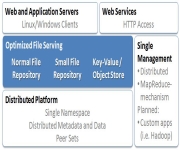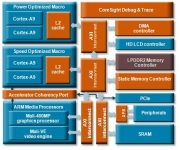Archive For October 17, 2009
Jeff Dean of Google did an excellent keynote talk at LADIS 2009. Jeff’s talk is up at: http://www.cs.cornell.edu/projects/ladis2009/talks/dean-keynote-ladis2009.pdf and my notes follow: · A data center wide storage hierarchy: o Server: § DRAM: 16GB, 100ns, 20GB/s § Disk: 2TB, 10ms, 200MB/s o Rack: § DRAM: 1TB, 300us, 100MB/s § Disk: 160TB, 11ms, 100MB/s o Aggregate…
I love Solid State Disks and have written about them extensively: SSD versus Enterprise SATA and SAS disks Where SSDs Don’t Make Sense in Server Applications Intel’s Solid State Drives When SSDs Make Sense in Client Applications When SSDs Make Sense in Server Applications 1,000,000 IOPS Laptop SSD Performance Degradation Problems Flash SSD in 38%…
In past posts such as Web Search Using Small Cores I’ve said “Atom is a wonderful processor but current memory managers on Atom boards don’t support Error Correcting Codes (ECC) nor greater than 4 gigabytes of memory. I would love to use Atom in server designs but all the data I’ve gathered argues strongly that…
Data center networks are nowhere close to the biggest cost or the even the most significant power consumers in a data center (Cost of Power in Large Scale Data Centers) and yet substantial networking constraints loom large just below the surface. There are many reasons why we need innovation in data center networks but let’s…
Microsoft’s Chicago data center was just reported to be online as of July 20th. Data Center Knowledge published an interesting and fairly detailed report in: Microsoft Unveils Its Container-Powered Cloud. Early industry rumors were that Rackable Systems (now SGI but mark me down as confused on how that brand change is ever going to help…
I recently came across an interesting paper that is currently under review for ASPLOS. I liked it for two unrelated reasons: 1) the paper covers the Microsoft Bing Search engine architecture in more detail than I’ve seen previously released, and 2) it covers the problems with scaling workloads down to low-powered commodity cores clearly. I…
This is 100% the right answer: Microsoft’s Chiller-less Data Center. The Microsoft Dublin data center has three design features I love: 1) they are running evaporative cooling, 2) they are using free-air cooling (air-side economization), and 3) they run up to 95F and avoid the use of chillers entirely. All three of these techniques were…

Here’s another innovative application of commodity hardware and innovative software to the high-scale storage problem. MaxiScale focuses on 1) scalable storage, 2) distributed namespace, and 3) commodity hardware. Today’s announcement: http://www.maxiscale.com/news/newsrelease/092109. They sell software designed to run on commodity servers with direct attached storage. They run N-way redundancy with a default of 3-way across storage…

ARM just announced a couple of 2-core SMP design based upon the Cortex-A9 application processor, one optimized for performance and the other for power consumption (http://www.arm.com/news/25922.html). Although the optimization points are different, both are incredibly low power consumers by server standards with the performance-optimized part dissipating only 1.9W at 2Ghz based upon the TSMC 40G…

AJAX applications are wonderful because they allow richer web applications with much of the data being brought down asynchronously. The rich and responsive user interfaces of applications like Google Maps and Google Docs are excellent but JavaScript developers need to walk a fine line. The more code they download, the richer the UI they can…
In The Case for Low-Cost, Low-Power Servers, I made the argument that the right measures of server efficiency was work done per dollar and work done per joule. Purchasing servers on single dimensional metrics like performance or power or even cost alone, makes no sense at all. Single dimensional purchasing leads to micro-optimizations that push…
The server tax is what I call the mark-up applied to servers, enterprise storage, and high scale networking gear. Client equipment is sold in much higher volumes with more competition and, as a consequence, is priced far more competitively. Server gear, even when using many of the same components as client systems, comes at a…
We’re back from China last Saturday night and, predictably, I’m swamped catching up on three weeks worth of queued work. The trip was wonderful (China Trip) but it’s actually good to be back at work. Things are changing incredibly quickly industry-wide and it’s a fun time to be part of AWS. An AWS feature I’ve…
I’ll be taking a brief hiatus from blogging during the first three weeks of August. Tomorrow we leave for China. You might wonder why we would go to China during the hottest time of the year. For example, our first stop, Xiamen, is expected to hit 95F today, which is fairly typical weather for this…
Search is a market driven by massive networking effects and economies of scale. The big get better, the big get cheaper, and the big just keep getting bigger. Google has 65% of the Search market and continues to grow. In a deal announced yesterday, Microsoft will supply search to Yahoo and now has a combined…
MapReduce has created some excitement in the relational database community. Dave Dewitt and Michael Stonebraker’s MapReduce: A Major Step Backwards is perhaps the best example. In that posting they argued that map reduce is a poor structured storage technology, the execution engine doesn’t include many of the advances found in modern, parallel RDBMS execution engines,…